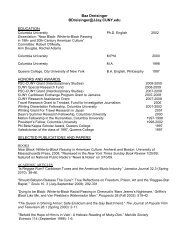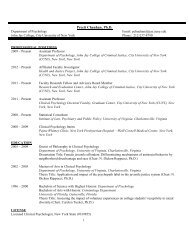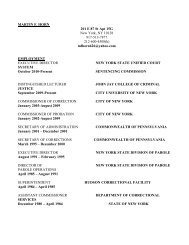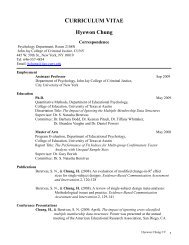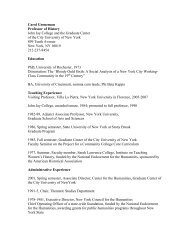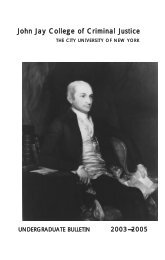Bulletin - John Jay College Of Criminal Justice - CUNY
Bulletin - John Jay College Of Criminal Justice - CUNY
Bulletin - John Jay College Of Criminal Justice - CUNY
Create successful ePaper yourself
Turn your PDF publications into a flip-book with our unique Google optimized e-Paper software.
Academic Standards<br />
All notifications are e-mailed directly to the student’s college e-mail<br />
address. All grades (A to WU) of courses taken on permit at <strong>CUNY</strong><br />
colleges will be posted to the student’s record and computed into his<br />
or her overall grade point average. Students receiving a failing grade<br />
(WU, F) for a course taken on permit will not benefit from the <strong>CUNY</strong><br />
F-grade policy.<br />
Approval to Take Courses on Permit at Non-<strong>CUNY</strong><br />
<strong>College</strong>s<br />
All students seeking a permit to a non-<strong>CUNY</strong> institution must make<br />
an appointment to see the permit coordinator at the <strong>Of</strong>fice of the<br />
Registrar. Students must bring a copy of the most recent college<br />
catalog of the institution they plan to attend to the appointment. The<br />
catalog must have course descriptions of the classes.<br />
Students planning to take courses on permit at a non-<strong>CUNY</strong><br />
educational institution while enrolled at <strong>John</strong> <strong>Jay</strong> <strong>College</strong> must obtain<br />
permission via a paper permit in advance from the <strong>Of</strong>fice of the<br />
Registrar. Guidelines are available at the <strong>Of</strong>fice of the Registrar or<br />
by visiting the Registrar's <strong>Of</strong>fice site on the <strong>College</strong>'s home page,<br />
www.jjay.cuny.edu.<br />
Permits to non-<strong>CUNY</strong> Institutions require that payment be made at<br />
the host institution. Students will be liable for the tuition rate of the<br />
college they plan to attend outside the <strong>CUNY</strong> system.<br />
Students are responsible for arranging to have an official transcript<br />
sent from the host institution to <strong>John</strong> <strong>Jay</strong> Cllege.<br />
ATTENDANCE<br />
Standard Courses<br />
Students are expected to attend all class meetings as scheduled.<br />
Excessive absence may result in a failing grade for the course and<br />
may result in the loss of financial aid. The number of absences that<br />
constitute excessive absence is determined by the individual<br />
instructor, who announces attendance guidelines at the beginning of<br />
the semester in the syllabus for the course. Students who register<br />
during the Change of Program period after classes have begun are<br />
responsible for the individual course attendance policy.<br />
Remedial and Developmental Courses<br />
In remedial and developmental courses, students are automatically<br />
considered excessively absent if their absences exceed the number of<br />
times a class meets in any two-week period and are not eligible for<br />
passing grades. In classes that meet once a week, more than two<br />
absences are excessive. In classes that meet twice a week, more than<br />
four absences are excessive. In classes that meet three times a week,<br />
more than six absences are excessive.<br />
The remedial and developmental courses are:<br />
English for Academic Purposes EAP 121 and 131<br />
English-W 100/SEEK English 093 and 094<br />
Mathematics 100/SEEK Mathematics 095<br />
Mathematics 103<br />
Communication Skills 101/SEEK Communication Skills 101<br />
Communication Skills 102/SEEK Communication Skills 102<br />
Speech 101<br />
Academic Integrity<br />
Note: The following information is excerpted from the <strong>CUNY</strong> Policy<br />
on Academic Integrity. See the Appendix of this bulletin for the<br />
complete text of the <strong>John</strong> <strong>Jay</strong> <strong>College</strong> Policy on Academic Integrity,<br />
including sanctions, and the complete text of the <strong>CUNY</strong> Policy on<br />
Academic Integrity.<br />
Definitions and Examples of Academic Dishonesty<br />
Cheating is the unauthorized use or attempted use of material,<br />
information, notes, study aids, devices or communication during an<br />
academic exercise. The following are some examples of cheating,<br />
but by no means is it an exhaustive list:<br />
• Copying from another student during an examination or<br />
allowing another to copy your work<br />
• Unauthorized collaboration on a take-home assignment or<br />
examination<br />
• Using notes during a closed-book examination<br />
224



